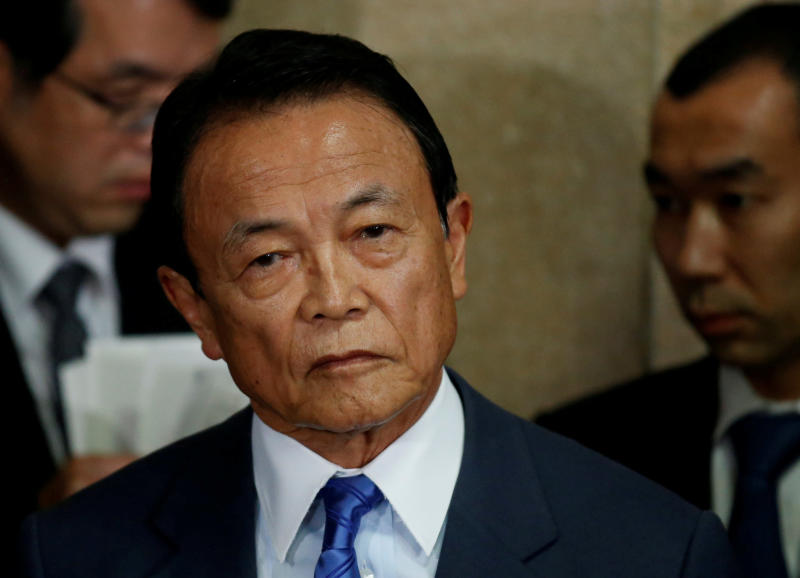Japan Finance Minister Taro Aso apologises for saying sexual harassment not a crime
Sign up now: Get insights on Asia's fast-moving developments

Japan's Deputy Prime Minister Taro Aso was criticised for saying that sexual harassment is not "same as murder or sexual assault".
PHOTO: REUTERS
Follow topic:
TOKYO - Japan's gaffe-prone Deputy Prime Minister Taro Aso apologised on Friday (May 11) for saying that "sexual harassment is not a crime", in a remark that has been slammed by fellow Cabinet minister Seiko Noda as callous and insensitive.
"There is no criminal charge for sexual harassment," Mr Aso, who is also Finance Minister, said last week. "It's not the same as murder or sexual assault."
But in his apology he gave the caveat that his comments should be seen in the context that Japan's Penal Code has no laws which cover "sexual harassment" as an offence.
"It was careless, and I've been told it makes light of sexual harassment. I'll be more careful in future," he told Parliament on Friday, adding that he would watch his mouth in case the public think he is trivialising the matter.
Mr Aso's remark last week sparked small-scale protests in cities from Sapporo to Kyoto, and came at a time Prime Minister Shinzo Abe is himself facing stiff domestic political pressure over two cases of alleged cronyism.
"Mr Aso's remarks could have considerably hurt the feelings of victims, and as politicians we must always put ourselves in the position of others," Mr Abe told a Fuji Television programme on Friday. "I note that Mr Aso has withdrawn his comments. We must be extremely careful with our words."
Opposition leader Yukio Edano of the Constitutional Democratic Party of Japan, meanwhile, told reporters on Friday: "Without a common recognition in society about the issue of sexual harassment, Japan will be left behind with the times."
Ms Noda, who is Internal Affairs Minister and Minister-in-charge of female empowerment, said on Monday in response to Mr Aso that she intends to push for debate in Parliament for legal penalties to be imposed against sexual harassment.
Mr Aso, 77, belongs to a generation with "a totally different perception" of sexual harassment from others, added the 57-year-old.
Japan, a patriarchal society, has been slow to come on board the #MeToo movement that has swept the world. Last year, freelance journalist Shiori Ito faced death threats and vulgar slurs when she accused Mr Abe's former biographer of sexual assault. Her case was dropped by criminal investigators.
Mr Aso's comments came in light of a sexual harassment scandal which implicated his top ministry bureaucrat.
Former vice-finance minister Junichi Fukuda quit last month, saying he was unable to do his job in the face of media pressure, but protests his innocence and intends to sue the weekly Shukan Shincho tabloid for libel.
The magazine last month published a report accusing him of sexually harassing female reporters with comments such as "Can I touch your breasts?"
It later published audio evidence of what sounded like Mr Fukuda making the comments. TV Asahi has said one of its reporters was a victim.
Mr Fukuda told reporters that the furthest he had gone with female reporters was "wordplay", and that his words must be seen in full context.
He added, when asked if it was his voice in the recording: "I cannot tell if it is my voice since I only hear my voice through my own body."
On Friday, Mr Aso also retracted a comment that Mr Fukuda might have been "entrapped" in the simmering scandal.
He has previously said he "could not rule out the possibility" that the female reporters might have intentionally lured Mr Fukuda into making sexual remarks.
And while several local media have quoted Mr Aso as having said that there would not be any sexual harassment incident if only male reporters covered the Finance Ministry, he said on Friday that he does not remember having made such comments.

